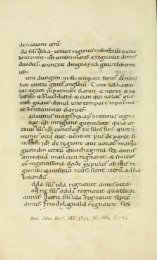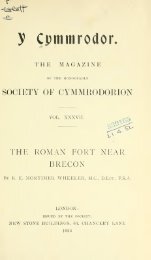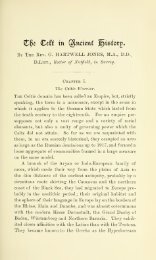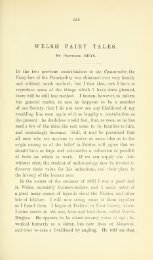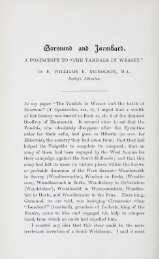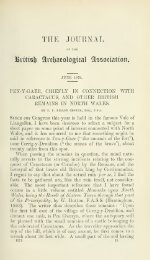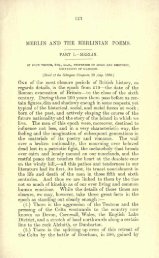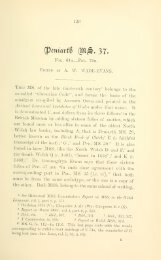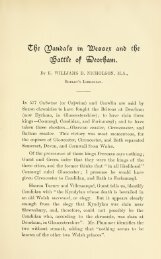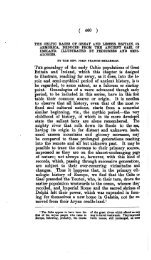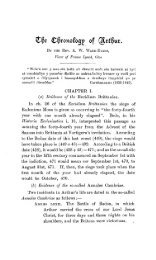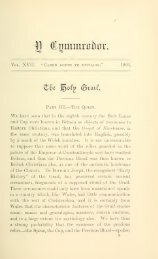An Introduction to Early Welsh - Arthur Pendragon of Wales
An Introduction to Early Welsh - Arthur Pendragon of Wales
An Introduction to Early Welsh - Arthur Pendragon of Wales
You also want an ePaper? Increase the reach of your titles
YUMPU automatically turns print PDFs into web optimized ePapers that Google loves.
i<br />
3 4 RESPONSIVE PARTICLES. [239.<br />
moruyn the law says it is right <strong>to</strong> try whether she is a maiden<br />
or whether she is not a maiden BCh. p. 40 ; ny wydyat hitheu<br />
beth a wnaei . . . ae<br />
know what she<br />
dywedut hynny ae tewi she did not<br />
should do, whether she should tell that or keep silent<br />
R.B. 270; either or, e.g. a uynny di ae diawt ae dim dost thou<br />
1<br />
desire drink or anything } RB. 276 ;<br />
a thebic i<br />
yw genhyf na doeth<br />
y wrthunt heb lad ae rei onadunt ae cwbyl and I think that he did<br />
not leave them without slaying either some or all <strong>of</strong> them WB. p 221.<br />
240. pony ( = Ir. cani), before vowels ponyt ; with the present<br />
<strong>of</strong> the copula ponyt = nonne? e.g. pony chlywy<br />
di dost thou not<br />
hear? RB. 272 ; ponyt oed iawn y titheu would it not be right fot<br />
thee? RB. 246.<br />
RESPONSIVE PARTICLES.<br />
241. In answers <strong>to</strong> questions the verb or the predicate<br />
noun is<br />
<strong>of</strong>ten repeated, e.g. a gaffaf i letty gennyt ti, heb y Peredur. keffy,<br />
heb ynteu, yn llawen "shall I get a lodging with thee?" said Peredur.<br />
" Yes" said he, "gladly" ;<br />
a yttiw Kei yn llys <strong>Arthur</strong>. Yttiw " is Kei<br />
"<br />
in <strong>Arthur</strong>'s court l ?" Yes"; ae amser ynni vynet yr byrdeu. amser<br />
"is it time for us <strong>to</strong> go <strong>to</strong> table?" "Yes" In negative answers<br />
na(c) is used, e.g. a atwaenost di y<br />
marchawc racco mawr. nac<br />
atwen " knowest thouyondergreat horseman ? " "No " dywet, heb ef,<br />
a vu ef gennyt ti a gwneuthur anuod arnat. na vu, myn vyg cret,<br />
heb hi, na cham nys goruc ym "tell me" said he, "was he with thee<br />
and did he do violence <strong>to</strong> thee?" "No," said she, "and he did me no<br />
wrong" ; ae byw. na vyw "is he alive? " "No" In answer <strong>to</strong> ae,<br />
nac ef (<br />
= Mod.W. nage)<br />
is found, e.g. dywet unbenn, heb ef, ae<br />
o anwybot ae o ryfyc y keissut ti colli ohon<strong>of</strong> i<br />
vy rnreint . . .<br />
nac ef, heb y Gereint, ny wydy wn i kaethu fford y neb " tell me, sir,<br />
is it through ignorance or arrogance that thou didst seek <strong>to</strong> make me<br />
lose my privileged "No" said Gereint, "I did not know that the<br />
road was debarred <strong>to</strong><br />
any one " WB. p. 217.<br />
NOTE. nac ef is also found without a preceding question, e.g. arhowch<br />
ivith the ivorm.



